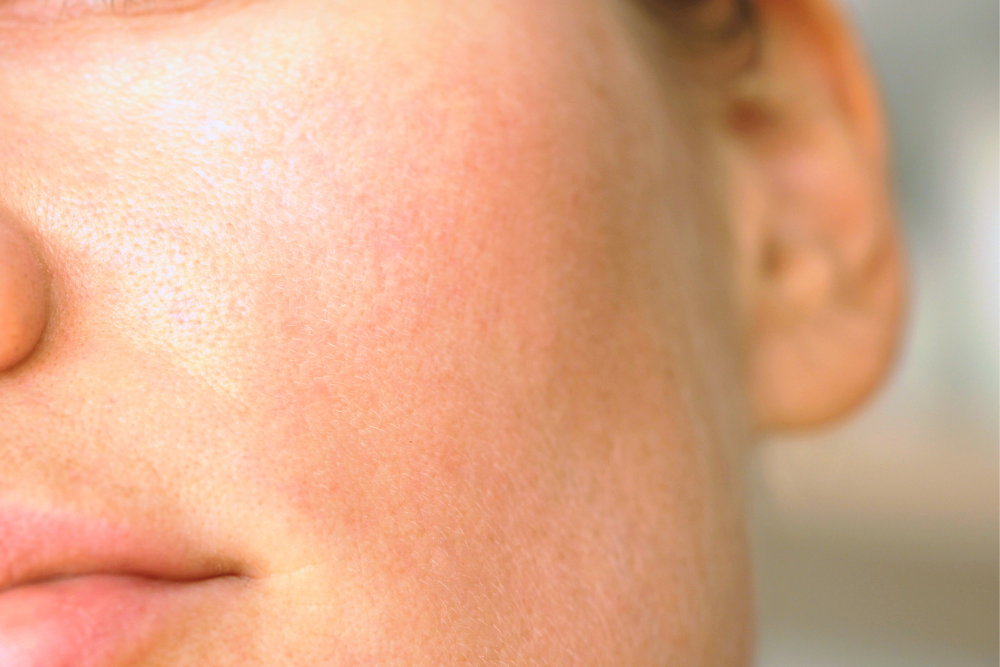In recent years, the research of the connection between the gut flora and skin health has grown significantly. Studies show that an unbalanced gut flora not only affects the immune system, hormones and inflammation levels in the body – but can also increase the risk of skin problems such as acne, rosacea, and eczema. By understanding how the so-called gut-skin axis works, we can also find new ways to support both the stomach and the skin from the inside.

The ‘gut-skin axis’ is an actual connection between our skin and stomach. A large part of this occurs through our microbiota (the ecosystem of bacteria and other living organisms that live in the gut and on our skin), and plays an important role in our health. An imbalance in either the skin or intestinal microbes can affect the other. Changes in the microbiome can be seen in a variety of health conditions, including mental health conditions, digestive problems such as IBS, and skin conditions. Research on the gut-skin axis has grown in recent years.
The composition of the gut flora affects the body’s inflammation levels, immune system, and hormonal balance, factors that all play an important role in the function and resilience of the skin. Imbalances in the intestinal flora can lead to inflammation, which in turn can cause common skin problems such as acne, rosacea and eczema. Certain intestinal bacteria have proven to be capable of influencing both the skin’s barrier function and inflammatory processes through the immune system.
A study has examined the connection between gut flora and skin diseases such as rosacea and acne. The results show that people with rosacea often have an altered gut flora, and that an imbalance in the bacterial composition of the stomach has also been linked to acne and increased sensitivity to inflammation in the skin. (Jie Yu. et al. 2024).
Another common skin condition is eczema, a chronic inflammatory skin condition characterised by dry, itchy skin that can damage the skin barrier, which is for retaining moisture and keeping allergens out. This can make people with eczema more vulnerable to bacterial, viral, and fungal infections of the skin. Research shows that people with eczema often experience imbalances in their microbiome and are deficient in certain oils in their skin. Research scientists have also identified that good bacteria can relieve eczema symptoms. (NIAID research 2024).
Another study investigated whether treatment with synbiotics could relieve eczema. Patients showed significantly reduced itching and dry skin, as well as improvements in redness, pain and their skin’s appearance. The study showed that a daily intake of synbiotics is therefore a promising treatment for relieving skin diseases such as eczema. (Noll, M. et al. 2021).
An imbalance in the gut flora can manifest itself on the skin in several different ways. Some of the most studied connections relate to:
Acne: Inflammation, hormonal influences, and oxidative stress that can be exacerbated by an unbalanced gut flora.
Rosacea: Linked to changes in gut flora and elevated levels of inflammation.
Eczema: Affected by immune regulation that is largely controlled by the gut.
Sensitive, reactive and inflamed skin: Can be exacerbated by low-grade systemic inflammation linked to the gut microbiome.
Several lifestyle factors can negatively affect the balance of the gut flora, which in turn affects the condition of the skin:
Diet: A diet low in fibre and high in processed foods reduces the diversity of the gut flora.
Stress: Affects the bacteria in the stomach via stress hormones and inflammation.
Lack of sleep: Can disrupt both hormonal balance and the composition of gut bacteria.
Lifestyle: Factors such as alcohol, smoking and low physical activity affect both the stomach and skin.
When these factors disrupt the balance of the gut flora, the risk of low-grade inflammation and hormonal imbalance increases, which are two of the main causes of skin problems.
For those of you who want to influence both your gut and skin health, there are several steps you can take:
– Eat a varied, high-fibre diet filled with lots of plant-based foods.
– Include fermented foods such as sauerkraut and kimchi.
– Reduce your intake of processed foods, refined sugars, and alcohol.
– Prioritise recovery and sleep.
– Manage stress through physical activity or relaxing activities.
– Reduce your sedentary lifestyle and increase your daily exercise.
– If you want to give your intestinal flora additional support, a dietary supplement with synbiotics is a good complement.
Synbiotics are a dietary supplement that combines probiotics (live beneficial bacteria) and prebiotics (fibres that act as nutrition for these bacteria). Together they support and balance the gut flora.
Healthline. (2025). How does the gut-skin axis affect eczema? Available at: https://www.healthline.com/health/eczema/how-does-the-gut-skin-axis-affect-eczema (Retrieved: May 6, 2025).
He, X., et al. (2024). Causal association of gut microbes and blood metabolites with acne identified through systematic Mendelian randomization. Scientific Reports, 14, 26816. https://doi.org/10.1038/s41598-024-78603-z
National Institute of Allergy and Infectious Diseases (NIAID). (2024). NIAID discovery leads to novel probiotic for eczema. Available at: https://www.niaid.nih.gov/news-events/niaid-discovery-leads-novel-probiotic-eczema (Retrieved: 6 May 2025).
Noll, M., et al. (2021). Improvement of atopic dermatitis by synbiotic baths. Microorganisms, 9(3), 527. https://pmc.ncbi.nlm.nih.gov/articles/PMC7998680/#sec5-microorganisms-09-00527
Yu, J., et al. (2024). Effect of combined probiotics and doxycycline therapy on the gut–skin axis in rosacea. mSystems, 9(11). https://journals.asm.org/doi/10.1128/msystems. 01201-24
Det ser ut til at du er i Norge. Besøk vår norske nettside her www.supersynbiotics.no